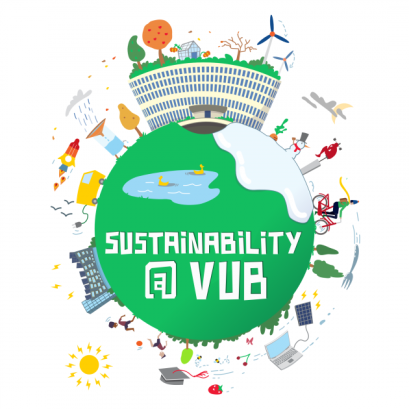
During the fifth edition of "Sustainable Tuesday" on November 5th, the VUB sustainability core group announced the CO2 measurement figures. Between 2016 and 2018, the carbon footprint of the VUB increased from 34,869 to 41,909 tons of CO2 on an annual basis. This wake-up call reinforces the determination of the VUB sustainability advisory board for a radically sustainable university: becoming climate neutral is the priority. A parking and flight policy, campus master plan and circular energy are some concrete actions.
With the ambition to become climate neutral by 2050 and to be a radically sustainable university, VUB remains a pioneer. Education and research projects also make that ambition tangible and prepare us for the challenges of tomorrow. The interdisciplinary course Sustainability, the Climate bootcamps, and the Green Impact project are proof of this. Numerous research projects support sustainability innovation, and the voices of our experts are becoming louder and louder.
Set a good example yourself
To achieve the VUB ambitions, a reduction of 3% of our climate impact is needed every year. To monitor this evolution, the climate impact of our organization is measured every two years. The absolute increase in our impact in recent years is the result of the strong growth of the VUB. But emissions per student also increased by 18%. Yet we are not left alone. A lot of services put hands on the VUB's climate ambitions.
Energy management and mobility on the right track
"Despite the campus expansion and construction projects, the VUB saved 2% on energy in the 2016-2018 period, but that should have been 3% annually," says energy coordinator Jeroen Willems. He sees many opportunities in the renewal of old research equipment, the installation of solar panels, the purchase of green energy and cooperation. "Different services install separate cooling and heating appliances, and many economies of scale are lost".
Commuter traffic accounts for around a quarter of our climate impact. “More and more VUB people live in Brussels, and the bicycle is gaining popularity. We are really an exemplary organization in terms of "steps, stairs and public transport," says mobility coordinator Rebecca Lefevere on the positive side. “At the same time, the total distance traveled is increasing. We remain a shuttle university. And yes, the number of cars can be further reduced. "
ABC travel policy and campus master plan
"Our international context also has a price," says Prof. Cathy Macharis. "We have little impact on the travel behavior of our students for the time being, but we are going to do something about staff missions, around 14% of our total climate impact." The implementation of the ABC travel policy is currently being prepared: 'avoid ',' book an alternative 'and' compensate '.
"We will focus on video conferencing for international meetings to avoid the relocation and we should take the train under six hours of travel time," continues Prof. Macharis, chairman of the VUB Sustainability Advisory Board. CO2 emissions can also be easily compensated. For this, VUB will work with a travel agency from mid-2020.
A future-proof approach
The "Sustainable Development Goals" of the United Nations are increasingly the "framework" for sustainability policy. The framework provides guidance, gives us direction and makes the link between sustainability and society clear. On Sustainable Tuesday, policy officer Chris Beirens presented a first translation into the strategic plan of the VUB.
However, transition expert Waldo Galle underlined that it should not be left to plan. “When plans are finally written, you often have to adjust them to the rapidly changing reality. Moreover, the VUB is a slow ship with many cabins, of which nobody really understands how it is sailing. As a result, you cannot work top-down, but you have to learn by doing what works. "
The success story of the VUB student restaurant proves that this hands-on approach works. "Serving more meals with lower CO2 emissions is possible thanks to a wide vegetarian and vegan selection, and the commitment to sustainable fishing," says Rebecca Lefevere. Thanks to a strong vision, practical experiments and the will to learn from it, the restaurant traveled well.
Every VUB member can contribute
Even though the results are not yet available today, the Vrije Universiteit Brussel is "on the move". The chance that our climate impact will decrease with the next measurement in 2020 is therefore realistic: climate measures are taking shape in all areas and every VUB member, from rector to student, can take concrete actions.
Nic Van Craen, general manager of the VUB:
“We still have work to do. A sustainable transition process is slow, and requires efforts from all actors."
